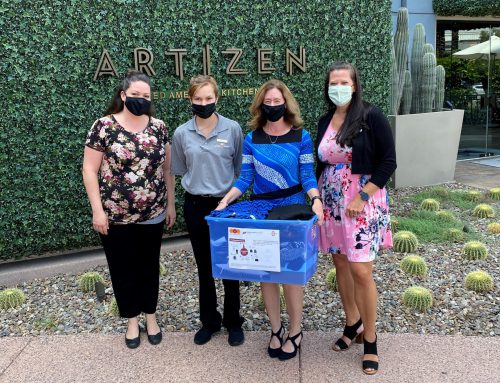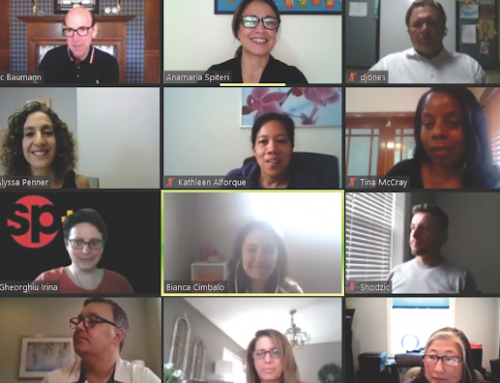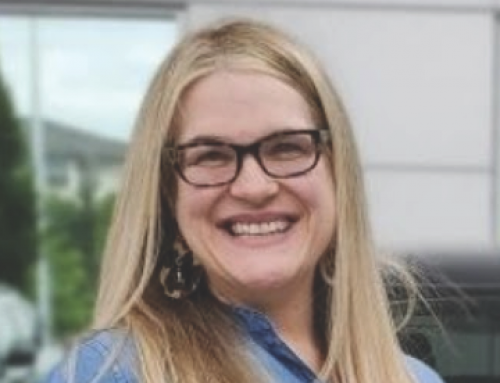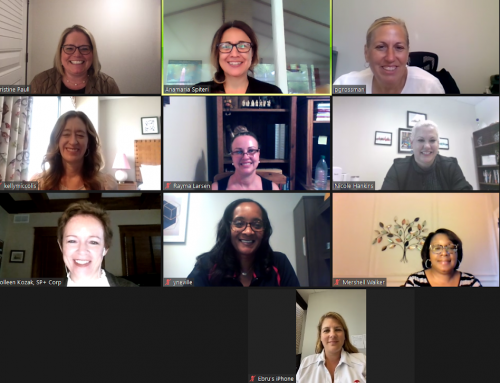The WAF New England Chapter (Boston) was gifted with the opportunity to attend the 15th annual Massachusetts Conference for Women. The Massachusetts Conference for Women provides one full day of connection, motivation, networking, inspiration and skill building for thousands of women each year.
Sessions and seminars included influential leaders such as Malala Yousafzai, Megan Rapinoe, Jaqi Wright, Lee Hartley Carter, and Cy Wakeman (just to name a few). Dozens of expert speakers lead workshops on the issues that matter most to women. The energy was palpable and education was continual. The conference presented an amazing opportunity to define and cultivate the leaders we need in this modern world.
A leader is a person who leads or commands a group, organization, or country. A leader’s role is to eliminate waste through efficient processes. Leaders change mindsets and manage the energy of people. And a leader can only lead with a clear vision that informs action and dictates behavior. A leader’s clear vision should be composed of three main elements: focus, persuasion, and motivation.
Leaders are individuals with the power to influence. And thus, “positional power” is a relic from the past. We are all leaders. And as a leader, we have the ability to promote change. When a leader has a clear and inspiring vision, followers will come, and it is the leader’s responsibility to support their followers. However, leaders who do not give/share power will lose the support of those they lead (disengagement). And thus, the most precious commodity is someone who is able to lead without ego.
Ego is a person’s sense of self-esteem or self-importance. The ego loves certainty over accuracy. In the absence of accurate data, the ego will make-up stories to justify the experienced emotion. The ego is what makes someone think it is more important for them to be right rather than focusing on how to “get it right”. Self-reflection cultivates accountability, thus leading to the death of the ego. Venting, gossiping, and “scorekeeping” is the egos way of avoiding self-reflection. As leaders, we have two choices; help or move-on. In order to reset a sympathetic mindset, please begin by taking a deep breath. And instead of offering “Why we can’t”, leaders offer “How we could”.
The death of the ego is the only way to counteract drama. Drama is anything that takes energy away from being productive. Did you know that on average, drama fills our minds 2.5 hours a day? That means drama takes up 17.5 hours a week. That is 70 hours a month of emotional waste! Sources of drama are broken down into five key elements:
- Ego, venting, gossiping, scorekeeping
- Lack of accountability
- Forgetting that “buy-in” is a verb
- Avoiding change (change is only hard for those who are not ready)
- Engagement without accountability (being entitled to reward without effort)
We cannot control other people, we can only influence. A key way to fight drama is counter negativity with positive statements. Positive emotions are just as contagious as negative ones.
A lot of people wait for happiness and satisfaction to happen. Happiness is a learned skill, not a trait. By ditching “drama” we will be able to drive big results and make room for happiness and satisfaction to strive. Our lives are not what happens to us; our lives are how we grow from it.
Stagnation is death. Chaos happens before the change. And discomfort is the catalyst to growth. Thus, leaders have to be resilient. Resilience is a muscle and you have to break a muscle down in order to build it back up. The way we view failure is more important than the failure itself. Remember that things happen so other things can happen. Your merit as a leader is not how you act/react in perfect situations; it is how you deliver results when things get difficult.
Values are essential for everyone but especially those who have taken on the responsibility of leadership. Values drive behaviors toward the clear vision that everyone is working toward. The way others treat you is not reflective of your values.
Transformational leaders understand that at the center of quality, time, and money are the people. To be an effective, respected, and influential leader is to emphasize the value of the individuals we lead. The most enduring leaders see people in front of them and lift those people to prioritize impact. Transformational leaders are willing to rumble with vulnerability, live into their values, brave trust, and learn to rise.
Are you being the best leader you can be? Are you bringing your most evolved self to work? What did you do to help? If you were great right now, what would “great” look like? Now that we know better, let’s do better by being authentic, embracing change, being kind!
Thank you Massachusetts Conference for Women for endowing us with the philosophies and sciences to go forth and develop into the highest form transformational leaders we can be!
Speakers whose concepts are referenced in this article are:
- Bea Arthur, LMHC, EdM, MA therapist and founder & CEO, The Difference
- Cy Wakeman, President, and Founder of Reality-Based Leadership
- Dr. Brene Brown, researcher, storyteller and TED speaker
- Jaqi Wright, Co-Founder of Furlough Cheesecake
- Lee Hartley Carter, President, Maslansky+Partners, Leading Communications Strategist & Author
- Mark Mack, Senior Director, Strategic Programs, and Sales Operations at Oracle






